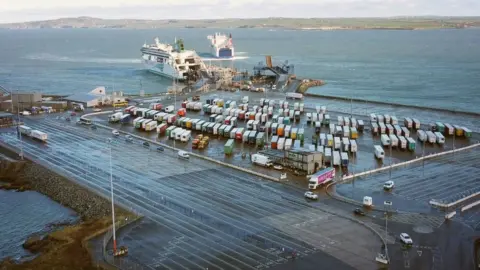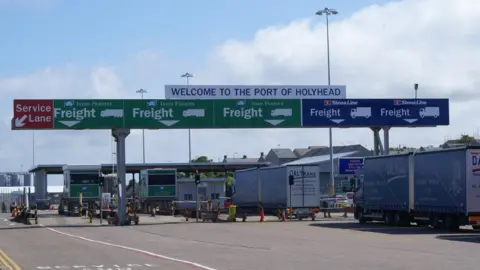Brexit: Welsh ports increasingly bypassed by Irish ferries
 AFP
AFPDozens of ferry routes avoiding Welsh ports have been established between Ireland and mainland Europe over the past year because of Brexit, Ireland's foreign affairs minister has said.
Simon Coveney said there were 44 direct routes between Ireland and the EU.
"That figure would have been less than a dozen this time last year," he said.
The UK government said the impact of the Covid-19 pandemic meant it was too early to judge the new trading relationship with the EU.
The use of a so-called land-bridge from Holyhead to Dover had been a vital part of supply chains in and out of Ireland, Mr Coveney told BBC Radio Wales' Sunday Supplement programme .
Land-bridge movements refer to lorries from Ireland crossing Wales and England en route to other EU countries.
The direct sea routes to France are slightly slower and more expensive than crossing the Irish Sea and then driving south through Wales and England to cross the Channel between Dover and Calais.
But going direct avoids the new post-Brexit checks and paperwork associated with the Dover-Calais route. It means lorries never leave the single market, and they avoid new customs formalities.
Before Brexit, Mr Coveney said the Irish government had looked at options for direct ferry routes between Ireland and mainland Europe.
"We knew that there would be disruption," he said.
"There'd be paper work, there'd be bureaucracy, there'd be delays, there'd be queues in trying to use the land-bridge."

He said the amount of Irish goods being sold into the UK had increased on last year, but goods "coming the other way" had decreased significantly.
"Companies have simply voted with their feet. For them certainty is what matters so that they can plan for the future," he said.
Mr Coveney was in Wales for the inaugural Wales-Ireland Forum and the official opening of the Irish Consulate in Cardiff.
He said the relationship with Wales was important to Ireland.
"Wales is our closest neighbour physically and we have a long history of co-operation, friendship, sporting competition but, most importantly, Welsh people and Irish people just get on well together," the foreign affairs minister said.
The EU and UK are set for an intense round of negotiations in the coming weeks after European Commission vice president Maroš Šefčovič unveiled a range of proposals aimed at cutting the red tape the Northern Ireland Protocol has imposed on moving goods from Great Britain to Northern Ireland.
However, the plan has not addressed a key UK demand - the removal of the oversight function of the European Court of Justice in the operation of the protocol.
The UK government said freight flow through all Welsh ports had improved "considerably" since January and it remained committed to their prosperity.
"The impact of the covid pandemic and restrictions across the world including in Europe has affected trade and depressed demand, so it is too early to draw firm conclusions on the impacts of our new trading relationship with the EU," said a spokesperson.
"The UK government will do all we can to support [Welsh ports]. We continue to help businesses get the support they need to trade effectively with Europe, including running export helplines such as the Export Support Service and webinars with experts, providing financial support to SMEs and delaying the introduction of full import controls."
A European Commission spokesperson has declined to comment on the talks.
